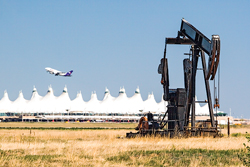|
Overshadowing the last several days of the XXII Winter Olympics, Ukrainian citizens and their political allies gave a proverbial middle finger to a too-cozy relationship with Russia. Enraged that now-former Ukrainian President Viktor Yanukovych squelched an economic relationship with the European Union (EU), in favor of a $15-billion bailout from Russia, mostly young protestors began demonstrating in the capital, Kiev, last November.
 |
A jetliner takes off on the east side of Denver International Airport’s main terminal, as a pumpjack bobs contentedly on the west side, at one of 76 wells on airport property (photo courtesy of Denver International Airport).
|
|
This clash of deals is important, because Ukraine, for years, has been plagued by corruption, as well as political and fiscal mismanagement. In addition, Ukraine has been unceasingly dependent on imports of Russian natural gas and beholden to the dictates of Russia, namely President Vladimir Putin. In the last couple of years, a growing number of Ukrainians had chafed under Russia’s domination—hence the attempt to reach a deal with the EU.
This subject was discussed during a briefing I had last October, with Ukrainian Deputy Prime Minister Yuriy Boyko, during his visit to Houston. Boyko stressed that Ukraine wanted to wean itself “away from Russian natural gas as quickly as possible.” To achieve that goal, Ukraine has encouraged domestic and foreign operators to invest in E&P projects. “Gazprom sells gas to us at three times what it costs in America,” said Boyko, “and this equates to about $11.50/btu, and it kills our economy. So, the more gas that we produce ourselves, the less that we have to import from Gazprom.”
Yet, just a week before the pact was to be signed, Yanukovych did an about-face and said that he would take the $15-billion bailout from Russia, instead. His excuse was that the EU wanted Ukraine to impose austerity measures in exchange for financial help. Ratcheting up in size over three months, the protests turned extremely violent during Feb. 18–21, killing at least 82 people. On Feb. 21, Yanukovych signed a compromise deal with opposition leaders, brokered by the German, French and Polish foreign ministers. But he fled Kiev the next day, and parliament impeached him, naming its speaker, Oleksandr Turchynov, as interim president on Feb. 23. Arseniy Yatsenyuk was named prime minister on Feb. 27.
A warrant was issued for Yanukovych’s arrest on Feb. 24, but he emerged under the protection of Russian officials on Feb. 28. Meanwhile, an emboldened Putin sent troops, military vehicles and helicopters into the Crimean peninsula on March 2, insisting that he was just protecting ethnic Russians. As this issue went to print, Ukraine mobilized 100,000 troops and called up all able-bodied men under 40.
Putin only wants people to fear him. At a minimum, he wants to restore the “spirit” of the Soviet Union. Yes, Ukraine is nearly bankrupt, but it’s not about the economics, it’s about grabbing the territory. After all, Russia still has troops in parts of Georgia, after invading that country in 2008, and despite that, the International Olympic Committee still let Putin have this year’s Winter Olympics in Sochi.
E&P benefits airports across the U.S. Onsite wells are helping U.S. commercial airports financially. In fact, within the last two years, the Federal Aviation Administration has had to issue new “advisory guidance” on “how to handle the rapidly growing oil and gas extraction activity on, and near, federally obligated airports nationwide.”
At Dallas-Fort Worth (DFW) International Airport, 112 Barnett shale gas wells produce on DFW’s property. Total royalties generated were $5.2 million in 2012, and $5.3 million in 2013. Chesapeake Energy paid an up-front, $186-million bonus in 2006 and remains the sole operator today. Due to low gas prices, Chesapeake was permitted to delay drilling six wells in 2013, and eight in 2014, by one year.
Northward, at the three Oklahoma City area airports, 87 of 102 oil and gas wells on their properties are active—71 at Will Rogers World Airport (WRWA), nine at Wiley Post Airport (PWA) and seven at Clarence E. Page Airport. These wells generated $2.8 million in royalties during 2012 and $2.5 million in 2013. These revenues fund grant matches for capital improvements. Marathon Oil is the primary WRWA producer, and Baron Exploration Company operates at PWA.
Northwestward, Denver International Airport (DEN), has 76 oil and gas wells, of which 66 are producing. In 2012, these wells generated $6.2 million in royalties. A majority of these wells were already on DEN property, when the airport opened in 1995. In March 2010, DEN spent $5.5 million to buy 27 wells on its property and, thus, control 100% of its royalties. The 66 active wells produce about 600 MMcfg, and 25,000 bbl of oil, per year.
At Bradford Regional Airport in Pennsylvania, shallow drilling has gone on for many years, and 32 oil and gas wells are operating. Officials may drill some Marcellus shale wells in the future. Over at Pittsburgh International Airport (PIT), there are no existing wells, but CONSOL Energy is preparing to begin a multi-year program in July that will drill 47 Marcellus wells. Last October, CONSOL completed seismic data acquisition without incident.
Finally, in North Dakota, state officials, last year, partially used oil and gas revenues to fund more than $27 million in grants to 11 airports experiencing record airline boardings and traffic, due to expanded E&P activity. 
|





